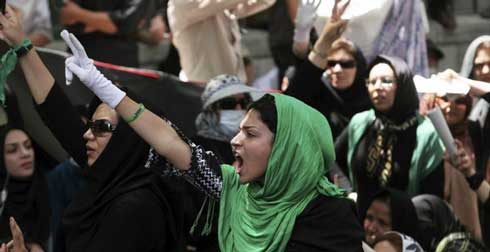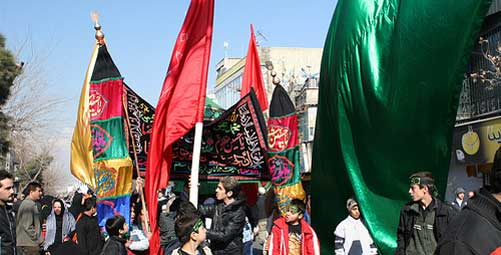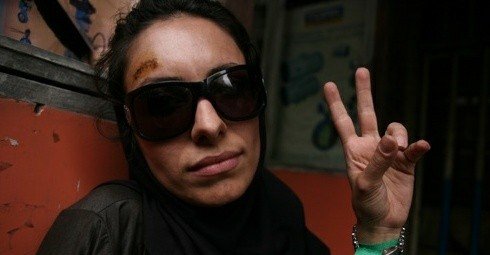
"Hungry stomach and religion don't get along."
Iranian proverb
As expected "Friday Prayer" in Teheran, on July 17th 2009 was attended by hundreds of thousands "newcomers" who turned regime's weekly political-religious show into a protest meeting against it. Chanting their own slogans, these uninvited visitors to the "prayground" of Teheran University demanded an end to lies, false elections, and oppression in the name of God. What nobody had expected was that "liberal" clerics now openly demanded "re-establishment of the public trust" in Rafsanjani's sermon. This demand was immediately attributed "operative" meaning when Khatami, the main ideological mentor of reformist groups, openly demanded a "referendum" on "people's approval or disapproval of country's existing conditions". "Existing conditions" being, albeit, the June uprisings with thousands of young people killed, injured, tortured or imprisoned by regime's militia after a fraudulent election approved of by the supreme religious ruler, ayatollah Khamenei!
For the first time in the Islamic Republic, the legitimacy of the ruling clergy is openly challenged by important members within the same clergy. For the first time, an important part of clergy is demanding a referendum on Khamenei's "Absolute Rule", (Valayate Faghih) which is the central question in Iranian administrative system, Shiite picture of an Islamic society, and Iran's relation to such modern global concepts as human rights and democracy. After the Islamization of Iran in the 7th century and the Islamic revolution of 1979, this is a historical point in Iran's history and a hypothesis is that following factors have attributed to this crystallization within Iranian political scene:
* increasing engagement of the Army of Islamic Guards (Sepahe Pasdaran) in economical activities (with own companies, seaports and airports, foreign transactions (enjoying total tax-exemption with no public or governmental insight)
* increasing influence of the Guards in internal and external politics, its military and intelligence cooperation with "East" (Russia, China, North Korea, Syria, Venezuela, Cuba, Hezbollah, Hamas)
* sharpening of the conflict between pro-West and pro-East factions within the government
* growing consensus among the youth, women, workers and the unemployed on the necessity of alliance with reformist groups within or close to the government for human rights, social justice and equality; an alliance based on non-violent methods and a gradual overthrow of the ruling elite with a so-called "color revolution"
Their stomachs may not be hungry, but with a huge hunger for a better life, freedom, and human rights, Iranians youth, workers and women are making history! After the presidential (s)election of Mahmoud Ahmadinejad in June 2009 (which turned to huge anti-regime protests and brutally suppressed), they have now forced reformist groups within or near to the clergy to take a little, but important step towards a legitimacy referendum.
The opposition has now raised the democracy demand as the first step towards a new social system in which their dreams for a better life and work can be fulfilled. The reformist clergy, on the other side, sees political reform as the only way to dismantle the present oligarchy representing the military-clergy alliance replacing it with an alternative alliance of technocrats and reformist clerics. The core of this alternative administration has ever since the Islamic revolution in 1979 managed to survive within the private sector, millions of government employees and non-military nationalized industrial workers. During this period, a chain of destructive factors has enabled the regime to gain legitimacy and suppress this alternative. Among these factors van be mentioned the generous moral/political support and advises from the Soviet (and its satellite Tudeh party), Saddam Hussein's criminal and provocative occupation of south-eastern provinces in Iran, the armed uprising and terrors by the People's Mojahedin, and above all, the popular belief that the 1979 revolution was a work of Western powers and that only these powers can make revolution undone!
The change in this sad setting came with Barack Obama. Within the framework of his New Global World Order, Obama reached his "open hand" to Khamenei's "clinched fist", not to confirm the regime's anti-global hard line, but rather to disarm and neutralize it. Obama's masterly formulated and timely delivered political invitation (just before the June presidential election in Iran) deprived the Iranian regime of its last internal propaganda weapon. USA had now officially recognized the principle of direct and unconditional negotiations with Iran, no matter which candidate would be elected as the new president. The message to the public opinion and the reformist opposition was pedagogic and clear: USA reached an open hand of friendship but is not going to help overthrow the Iranian regime; any initiative for a change must come from Iranians themselves.
The Iranian this initiative came without much delay. The June uprisings were in fact a street alliance for action between the oppressed groups of the society and the religious reformist groups (the reformist front under the ideological leadership of ex-president Mohammad Khatami). This alliance was based on a common understanding of the following aspects of the Iranian political reality:
* Isolation of the Iranian society from the process of modern globalization
* Total control upon financial markets, foreign transactions, and domestic wholesale trade by brokers and merchants organized as the pro-regime "Motalefeh" group
* Active political support and recognition of the regime by countries like Russia, Belarus, China, North Korea, Syria, Sudan, Venezuela, Cuba etc
* Obama's recognition of the Iranian conflict to be a domestic issue
* The regime is not interested in sharing the power or economical privileges with anybody
* The present constitutional rights and non-violent protests are fully adequate means and forms for a long-lasting popular uprising
Fair distribution of political power and representation, social participation, and equality in benefiting from countries vast economical resources are common interests which can be achieved through an effective division of tasks between the popular body of June uprisings and reformist groups. These groups enjoys knowledge and experience of organized political activity, invaluable kinship bands within the liberal Shiite clergy and the Khomeini family, and cooperation with national-religious groups such as "The Freedom Movement". With the exception of a few progressive professional organizations such as Iranian Lawyers Bar, Iranian Pen Club, Human Rights Association, independent workers' unions etc, other groups in this new alliance are unorganized without leaders of their own. Their main political education comes from 30 years of socio-political and religious experience under the conditions of the Islamic Republic. Their parents being the generation of the Islamic revolution with no historical perspective of social equality and justice except that of the Soviet socialism, the new generation who is now struggling on the streets benefits not only from a wider perspective, but also from the advantage of being a totally autonomous movement for "social equality and freedom". This autonomy gives them immunity against the "pro-Soviet" label their parents were often accused of.
During the last 30 years, the blame has always been put on the "Great Satan" (West and the US) at every Friday Prayer show. During last week's prayer, however, the main Satan was revealed by the anti-regime crowd shouting "Down with Russia, down with China!" whenever the "official slogan man" prompted the crowd to shout "Down with USA, down with Israel!"
Thanks to modern Information Technology, this movement has a clear picture of the remaining "socialist" block as "state-capitalist" workshops as well as a realistic vision for the new future; fair opportunities of participation in political and economical life. This alliance, as a whole, has a pragmatic agenda: the overthrow of "Valayate Motlaghe" (Absolute Rule) of Khamenei.
Having reached at this common understanding, the June alliance now acts like a tribunal where every false claim, every misleading slogan, and every violation of human rights by the regime is revealed and countered by democratic demands. That is how regime's (s)election show was turned into peaceful demonstrations with slogans like "Give back my vote!", "Death to the Dictator!" and " Free political prisoners!" And that is how the Friday Prayers in Teheran University are most likely going to be the Assemblée nationale of the Iranian Revolution whith the regime posited inside the « prayground" and the popular opposion filling every single street which ends to the University compund.








